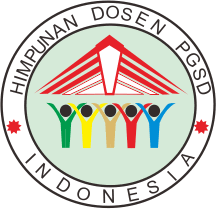Peningkatan sikap rasa ingin tahu peserta didik dalam pembelajaran IPA menggunakan model problem based learning (PBL)
Abstract
Abstract. This study aims to improve students' curiosity attitudes by applying the Problem based learning learning model. This research is a class action research with three cycles. The subject of this study was 36 grade elementary school students in the academic year 2019/2020, totaling 36 students. Data collection techniques use the results of observations, interviews and documentation. Data validation using the Triangulation technique. The data analysis model used is Miles and Huberman's interactive analysis model with 4 components. The results of the study show that the application of the problem based learning model can raise the curiosity attitude of fifth grade elementary school students in the academic year 2019/2020.
Keywords: curiosity attitude, problem based learning model, elementary school
Keywords
Full Text:
PDFReferences
N. Wedyawati and Y. Lisa 2019 Pembelajaran IPA di Sekolah Dasar 1st ed.( Yogyakarta: CV Budi Utama). [2] S. Raharja, M. R. Wibhawa, and S. Lukas 2018 Mengukur Rasa Ingin Tahu Siswa [Measuring Students’ Curiosity] Polyglot J. Ilm. 14 (2) 151 [3] Z. Zetriuslita, W. Wahyudin, and J. Jarnawi 2017 Mathematical Critical Thinking and Curiosity Attitude in Problem Based Learning and Cognitive Conflict Strategy A Study in Number Theory course : Int. Educ. Stud 10(7) 65 [4] I. H. Ameliah, M. Munawaroh, and A. Muchyidin 2016 Pengaruh Keingintahuan dan Rasa Percaya Diri Siswa terhadap Hasil Belajar Matematika Kelas VII MTs Negeri 1 Kota Cirebon Eduma 5 (1) 9–21 [5] E. F. Fadella and A. Prabowo 2018 Keefektifan Problem-Based Learning Berbantuan Komik Matematika terhadap Kemampuan Pemecahan Masalah dan Rasa Ingin Tahu Siswa Prism. Pros. Semin. Nas. Mat 1 77–86,. [6] Asnaeni, L. Lestari, and I. R. W. A. Atmojo 2017 Penerapan Model Pembelajaran Problem Based Learning (Pbl) Untuk Meningkatkan Sikap Ilmiah Pada Pembelajaran Ipa Siswa Sekolah Dasar J. Didakt. Dwija Indria (4) [7] W. Oktavioni 2017 Pembelajaran Ipa Melalui Model Discovery Learning Di Kelas V Sd Negeri 186 / 1 Sridadi Program Studi Pendidikan Guru Sekolah Dasar 1–21 [8] Iklima2018 Meningkatkan rasa ingin tahu siswa melalui model problem based learning ( PBL ) unja [9] H. A. Sujana and A. K. Jayadinata 2018 Pembelajaran Sains di Sekolah Dasar Jawa Barat: UPI Sumedang Press [10] S. I. I. R. W. A. Fajar Puji Hardono 2017 Penerapan Model Pembelajaran Problem Based Learning (Pbl) Untuk Meningkatkan Keterampilan Proses Ipa Pada Siswa Sekolah Dasar J. Didakt. Dwija Indria 5 (4) [11] Sugiyanto 2010 Model-model pembelajaran inovatif Surakarta: yuma pustaka [12] Sujarwo 2011 Model-Model Pembelajaran Yogyakarta: Venus Gold Press [13] A. Suprijono 2016 Model-Model pembelajaran Emansipatoris Surabaya: Pustaka Pelajar [14] R. A. Rosinta, Asrul 2014 Evaluasi Pembajalaran Medan: Citapustaka Media [15] E. Ceker and F. Ozdamli 2016 Features and characteristics of problem based learning,” Cypriot J. Educ. Sci 11 (4) 195–202 [16] A. G. Balim, D. Inel-Ekici, and E. Ozcan 2016 Concept Cartoons Supported Problem Based Learning Method in Middle School Science Classrooms J. Educ. Learn 5(2) 272, 2016 [17] E. DE Graaff,2003 Characteristics_of_Problem-Based_Learnin TEMPUS Publications 19 (5) 657–662 [18] B. T. Aditian, E. S. Markamah, and I. R. W. Atmojo 2014 Penerapan Model Pembelajaran Kooperatif Time Token Arends Berbasis Problem Based Learning Untuk Meningkatkan Pemahaman Konsep J. Didakt. Dwija Indria 2(8)
Refbacks
- There are currently no refbacks.



